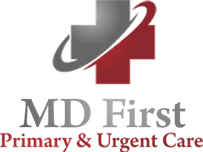Autism spectrum disorders encompass various characteristics with varying degrees of impairments in social interactions, communication skills, and often repetitive behaviors. As a developmental disability, it can completely alter how one thinks and understands the world, and as a spectrum, every autistic person is different. As a parent, it’s important to know what autism is and how it can affect your child, and at MD First Primary & Urgent Care, we can provide effective support for children and families when identifying and treating health concerns for autistic patients.
What Does it Mean For Your Child To Have Autism Spectrum Disorder?
Autistic people think differently from non-autistic people, often experiencing differences in sensory processing with vision, touch, hearing, smell, and taste. When a child has autism, they experience the world differently and therefore engage in their world through how they interpret things. Every autistic child is different; that’s why autism is referred to as a spectrum, as it encompasses different symptoms and characteristics that vary according to each person’s experience.
However, when psychiatrists diagnose autism, certain characteristics can be traced. These include:
- Poor Eye Contact: Many autistic children experience difficulties with eye contact, as eye contact requires attention and can impact their sense of vision. While most non-autistic people can talk, listen, and look at someone simultaneously, autistic people can experience difficulties managing the input they receive from their environment.
- Lack of Social or Emotional Response: People use nonverbal communication all the time, and most people can read and understand nonverbal communication, such as facial expressions, body language, and tone of voice. For autistic children and adults, nonverbal communication can be difficult to understand and imitate, and that input can be difficult to handle all at once. Some autistic people often appear to lack facial expressions or have different body language methods, such as stimming, and therefore communicate with others differently.
- Delayed Developmental Milestones: Some autistic children will experience a delay in their speech until they are much older or may experience difficulties in understanding academic topics such as math or English literature. Every autistic child grows at their own pace and, in some cases, may not ever reach a specific milestone. While this may appear as something tragic, some methods of intervention can help, such as speech and language therapy, behavioral interventions, and social skill training, to help them maneuver through life.
When a diagnosis is reached, it’s important to work with a supportive healthcare team that understands your child’s needs and can provide them with the resources they need to advocate for themselves and grow. As each child is unique, your healthcare members should always tailor their approach to meet their needs and work on their strengths for better health and well-being.
Let Us Help Your Child Experience A Full Life
While an ASD diagnosis can seem confusing for families, it’s important to remember that having an autistic child can bring out more joy in your life than ever before when they’re seen as a gift in your life. At MD First Primary & Urgent Care, we work to advocate for their health and agency and empower them and their families toward better health. For more information about how we care for autistic patients, contact us today by calling (803) 283-2300 and visiting us in Lancaster, SC.




